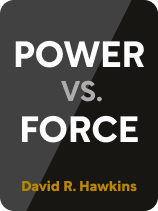

This article is an excerpt from the Shortform book guide to "Power vs. Force" by David R. Hawkins. Shortform has the world's best summaries and analyses of books you should be reading.
Like this article? Sign up for a free trial here.
Can your body discern truth from lies? What happens when you rely on force rather than power?
Despite its title, Power vs. Force by David R. Hawkins is really about human consciousness: what it is, how to measure it, how you can boost your consciousness, and why you should. He discusses what he believes are links between your level of consciousness and your beliefs, behaviors, and emotions.
Continue reading for several Power vs. Force quotes, along with some helpful context and explanation.
Power vs. Force Quotes
Hawkins believed that, as well as having individual consciousness, we all have access to a universal consciousness. By boosting your consciousness level, you can connect to this universal consciousness and glean its wisdom. Further, the higher you boost your consciousness level, the happier you’ll be, and the more you’ll contribute to the world.
Let’s examine five Power vs. Force quotes that provide insight into the book’s ideas.
“All of us have available at all times a computer far more advanced than the most elaborate artificial intelligence machine—the human mind itself.”
Hawkins defines “consciousness” as the ability to experience and understand yourself and your environment. Hawkins says this is possible because your brain is like a biological computer: It takes in data through your senses, then processes that data with electrical and chemical signals, resulting in what you perceive as thoughts and experiences.
Hawkins also says that your mind has access to a universal consciousness shared by all people—the universe’s internet, to extend the computer metaphor.
(Shortform note: The brain-as-computer metaphor is an old one, and hotly debated. Some experts argue that viewing thought as just a series of inputs and outputs misses the point of consciousness: that you’re not just a machine responding to stimuli, but rather a living being who experiences the world around you. Although Hawkins uses the brain-as-computer metaphor, he arguably addresses these critiques of it by proposing a definition of consciousness that emphasizes experiencing the world.)
“The body can discern, to the finest degree, the difference between that which is supportive of life and that which is not.”
Hawkins spent decades studying kinesiology, which is the science of how the human body moves. Through his studies, he found that the body and mind are intrinsically linked. Therefore, if your mental connection to the universal consciousness is strong enough, you can use basic physical tests to interpret the truth signals you’re receiving. Hawkins calls this applied kinesiology.
Hawkins describes several different kinesiology tests, but the common theme is that your muscles become weaker when you’re exposed to something that’s untrue, unhealthy, or undesirable.
Crucially, this isn’t testing whether you think the statement is true; it tests whether the statement is objectively true, which is possible because of your connection to the universal consciousness. The same holds true for testing whether something is good or bad for you.
“Facts are accumulated by effort, but truth reveals itself effortlessly.”
Hawkins says your connection to the universal consciousness allows you to instantly know whether something is true or false, so long as you can receive and understand the universal consciousness’s signals. In other words, it’s the ultimate source of truth, and with a strong enough connection to it, you become effectively omniscient.
When you’re in a powerful state of over 200 on the consciousness scale, you work together with others to achieve the best possible outcomes for both yourself and everyone else. You’re receptive to the universe’s truth signals; they simply come to you without effort on your part.
“Force is experienced through the senses; power can be recognized only through inner awareness.”
The lower end of the consciousness scale (below 200) represents what Hawkins calls force: aggressive, harmful, and egotistical states of consciousness. When you rely on force, you try to get what you want by bullying or manipulating others.
A level of 200 and above on the consciousness scale is associated with what Hawkins calls power: cooperative, loving, and understanding states of consciousness. Hawkins says that you reach this level of consciousness when your actions, goals, and morals are all aligned with one another.
“Force can bring satisfaction, but only power brings joy. Victory over others brings us satisfaction, but victory over ourselves brings us joy.”
Hawkins says that force might lead to short-term satisfaction, but never to true happiness. At this low level of consciousness, you’re unreceptive to the truth—you can’t determine what you really want out of life or how to get it.
On the other hand, power is associated with a level of 200 and above on the consciousness scale. It’s productive in and of itself—as opposed to force, which is only useful when used against something else.
Hawkins says that everything you do gets you closer to one of your goals; and those goals are based on your values, meaning that reaching them will make you happier.
When you’re in a powerful state of over 200 on the consciousness scale, you work together with others to achieve the best possible outcomes for both yourself and everyone else. First, you’re receptive to the universe’s truth signals, meaning that you can understand how to live a life that will make you truly happy.

———End of Preview———
Like what you just read? Read the rest of the world's best book summary and analysis of David R. Hawkins's "Power vs. Force" at Shortform.
Here's what you'll find in our full Power vs. Force summary:
- A complete guide to human consciousness
- How to connect with universal consciousness and glean its insights
- How to use applied kinesiology to tell if something is true or false






